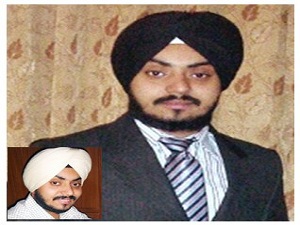WASHINGTON - He came to the United Stated in 2006 on a student visa. Now he is the latest Sikh recruited into the Army.
 |
| Image courtesy: Harsimran Kaur |
| Simran Preet Singh, third Army recruit in less than a year |
Simran Preet Singh Lamba has always been interested in the military. When he heard about the accommodation for kesh and dastaar granted to two Sikhs last year, he knew this was the path for him.
Simran Preet Singh finished his master’s degree in electrical engineering from the Polytechnic Institute of New York University and was working as an engineer when he enlisted. As an Indian national, he was recruited specifically for his Punjabi language skills under the Military Accessions Vital to the National Interest program that accepts legal non-citizens with particular medical or language skill.
He began basic combat training on Sept. 1 at the Fort Jackson training center in South Carolina.
“The Army does not discriminate based on race, color, religion, or national origin,” said George Wright, Army spokesman at the Pentagon. “We are pleased that Mr. Lamba is willing to serve his country and believe we can accommodate his religious requests while ensuring his health and safety and those who serve alongside him.”
Like all recruits, Simran Preet’s cell phone was confiscated and he is not allowed media contact. He was not available for an interview.
His training will last 11 weeks and he has roughly a year of additional occupational training that is specialized for the work he will be assigned. But specifics of his future assignment are unknown at this time, said Harsimran Kaur, legal director of the Sikh Coalition, which assisted him with the accommodation process through the Washington-based law firm, McDermott Will and Emery.
The Army has no formal process for accommodations. Applicants have a better shot at winning an accommodation when backed by a civil rights organization, Harsimran Kaur said. This is a difficulty for Sikhs and for the general population. What is spelled out in Army regulations are guidance and policy for people already in the Army. For Sikhs, they have to tie up beards and wear specific dastaar colors.
Although Simran Preet Singh is the third Sikh to win an accommodation within the last year, Sikhs have been banned from the Army for the previous 23 years.
“When we don’t allow people of different religious background and religious practices, we say we stand for something and we don’t,” Harsimran Kaur said.
|
Simran Preet Singh's Readiness/Safety/Health Guidelines: Commanders will ensure specific guidelines on the length of hair and beard are in place so that doesn't interfere with training requirements (wearing helmet/gas mask). - PVT Lamba must ensure his appearance is neat and well maintained at all times. ~ from George Wright, |
From 1948 to 1984, Sikhs were permitted to serve in the Army while maintaining their articles of faith. Then, in 1984, the Chief of Staff of the Army eliminated the exception for Sikhs. But the Army grandfathered in Sikhs who were previously serving on active duty. As a result, Col. Arjinderpal Singh Sekhon, a doctor, and Col. G.B. Singh, a dentist, continued to serve with their Sikh identity until their retirement in 2009 and 2007, respectively.
In 1993, the Religious Freedom Restoration Act (RFRA) essentially elevated the standard by which individuals are accommodated based on religion. The government may substantially burden a person’s exercise of religion, but only if it demonstrates that the burden serves a compelling governmental interest and that it is the least restrictive means of furthering that interest.
“Mr. Lamba has been granted an appeal to wear a turban, beard, and uncut hair while attending Army Basic Combat Training,” Wright said by email. “The Army reviews appeals on a case-by-case basis, as each request must be evaluated on its own unique facts and individual circumstances.”
His exception can be revoked at any time based on military necessity but only with the approval of the Army’s deputy chief of staff, he added.
The same is true for the previous accommodations.
Capt. Kamaljeet Singh Kalsi, a military doctor, received his accommodation in October 2009. And 2nd Lt. Tejdeep Singh Rattan, a military dentist, received his accommodation in December 2009. Both are now on active duty.
“People understand that the policy has not changed, and that has caused a chilling effect (within the community),” Harsimran Kaur said. “There would be more interest if the Army changed its policy.”
Still, the coalition gets more cases than it can take on. Its lawyers have to sort through and choose the strongest ones, ones that can stand up to the political climate and are legally winnable, she said. “It’s a difficult call.”
The coalition is hopeful that the Army will one day welcome all Sikhs with open arms, without going through the accommodation process. It has had positive communication with the Army and with allies on Capitol Hill.
“We are laying a ground work for that,” she said. “They have been forward thinking. They are doing a lot of research, surveying commanders on what (they) think of Sikhs in the Army and (sorting through) the logistics of wearing helmets and gas masks."
And, according to a coalition news release, legislators also have been supportive: “During the last year, more than 50 members of Congress have written to military officials requesting that Sikhs be accepted into the U.S. armed forces.”
“We want the Army to understand that it is in (its) own best interest,” she added. “They are in need of recruits.”
When Simran Preet Singh left for Fort Jackson, he said that everyone he spoke to had knowledge of who he was and who Sikhs were, Harsimran Kaur said. “The Army went out of its way to make sure there was a smooth transition for him.”
He is the first non-officer to be accommodated in 30 years. He is the first to come in and be with a population of young recruits that may know little about Sikhs, Harsimran Kaur said.
“(But) he had an incredible reception, he told us before his phone taken away,” she said. “He was very happy.”
____________________
Copyright© SikhNN 2008 / © Copyright 2001-2010 Sikh News Network, LLC.
